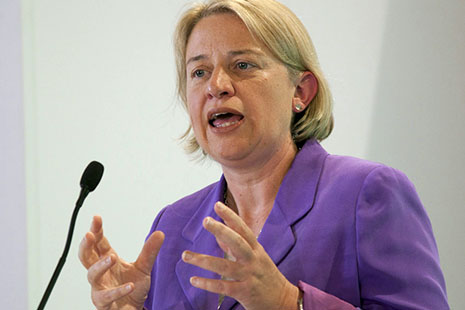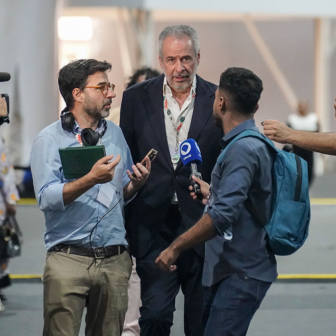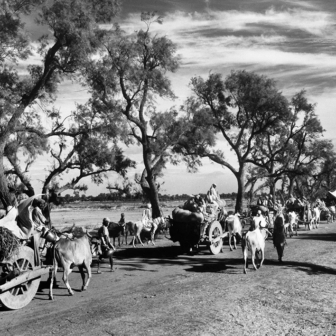ON a sunny Monday morning on 3 September last year, a dozen people gathered in the basement of the Green Party of England and Wales’s headquarters in London to count the ballot papers for the party leadership. At 11 am, Natalie Bennett, with 60 per cent of the vote, was declared winner, becoming the first Australian-born head of a political party in Britain.
I meet Bennett in a quiet, funky cafe at 4 Millbank, a heritage building just a cooee from the Houses of Parliament in central London. Apart from the quintessentially English backdrop of drizzle, bare trees and a desultory flow of pedestrians, the café could sit easily in Melbourne or Sydney. As could Bennett, who turns out to be an animated and fast-talking woman with a recognisable Australian accent.
“I joined the Greens on the first of January 2006,” she says, remembering the date like it was an epiphany. “I became concerned about bigger issues: the soil, the loss of biodiversity, climate change. It was like a New Year resolution about wanting to influence more broadly. And the best way to effect change is to get into politics.”
I ask the former editor of the highly regarded Guardian Weekly if top-tier journalism hadn’t given her enormous influence. “I very much enjoyed my two decades in journalism, and I am proud of some of the things I’ve done,” says Bennett. “But its influence on decision-making is indirect and the impact often hard to discern. It gets increasingly frustrating when you’ve been doing journalism for some time, to be reporting the same mistakes being made again and again. Take just one example, the Iraq war, then the Afghan war, then most lately sending British troops into Mali… I found the drive to try to directly effect change getting stronger and stronger.”
Bennett’s candidacy for leader didn’t immediately excite the passions of all party members. She had twice failed to win a local seat in her home borough of Camden and was unsuccessful in Holborn and St Pancras at the 2010 general election. She also had big shoes to fill; her predecessor as leader of the Green Party was the very impressive Caroline Lucas, who made history in 2010 as the first Green member elected to British parliament. The leadership vacancy arose after Lucas stepped down last year to concentrate on her role as MP for Brighton Pavilion.
Derek Wall, who teaches politics at the University of London and is the Green Party’s coordinator, says that while Bennett wasn’t seen as a favourite to begin with, her campaign and the strategic direction she outlined outshone those of her rivals. “The great thing about Nat is that she’s a deep thinker and a strategic thinker,” Wall says. “Her candidate statement made very important links between the environment, social justice and the economy; appealed to the different groups in the party, many of which come to us after they’ve become disillusioned with other groups, and she showed she had the drive and ambition to raise the gains for the party.”
Over the past few years, and mostly under Lucas’s leadership, the Greens have gained one seat in the national parliament, two seats in the European parliament, a minority Green Party council in Brighton and Hove, two members in the London Assembly (the elected body that scrutinises the activities of the mayor of London) and 150 local councillors across England and Wales. The membership of the party has also doubled over the past four years.
Bennett says that she wants not only to hold onto these “impressive” gains, but also to propel the party to much greater heights. “It’s very possible,” she says, pointing out the success of Greece’s Syriza party, a radical left-wing coalition that became the main opposition in Greece virtually overnight. “I hope we never go like Greece, but it shows it can be done.”
Over the next two years, she aims to greatly increase the number of councillors standing in local elections, which are due in some parts of the country as early as May. She also wants to see six Green members elected to the European parliament in 2014, and ten seats won at the next general election, due in 2015.
Matthew Goodwin, an associate professor of politics at the University of Nottingham, isn’t convinced these goals are achievable. “At present,” he says, “political debate is focused heavily on a rival minor party, the UK Independence Party (which has an anti–European Union platform), and while the Greens are likely to benefit from a collapse in the Liberal Democrat vote at the next general election, they will almost certainly not elect ten MPs.”
But, adds Goodwin, the party may well see an increase in support at the forthcoming European elections. The extra support will come from progressive and left-leaning voters dissatisfied with the record of the 1997–2010 Labour governments and the unpopular Liberal Democrats, who damaged their image for these voters by joining the coalition government with the Conservatives.
“The Green Party seeks to offer a radical alternative to what’s on offer at the moment,” says Bennett. “As a society we’re living like we have three planets instead of one. But there is no point blaming the individual: the person choosing to drive because it’s cheaper than the train; the old lady practically in tears because she wants to recycle but can’t walk to the bins because they’re too far. For people to do the ‘green thing’ it has to be the cheapest, easiest option every time.”
Among the controversial changes the Greens want to implement are the introduction of a minimum living wage set at 60 per cent of national average earnings (£8.10 per hour at the moment) and legislation mandating that no employee can earn more than ten times as much as the lowest-paid person in the company or organisation. They want to improve the government’s Energy Bill, including setting 2030 as a “decarbonisation” target, and to renationalise the railways and deprivatise bus networks as part of a broad push to improve local transport networks. They want to bring manufacturing jobs back to Britain and reduce unemployment. And they want to ensure that major companies set aside a minimum 40 per cent of board positions for women.
Bennett and the Greens face a number of serious hurdles in their campaign to attract voters. Not least is the lingering impression that the Greens are a single-issue party based around the environment, which seems to be out of step with people’s concerns about Britain’s continuing economic problems. A GlobeScan poll released in February showed public concern about environmental issues, including global warming, had dropped to its lowest level in twenty years.
Another hurdle for Bennett and her party is Britain’s first-past-the-post voting system, which makes it much harder for small parties to get into the British parliament than under the proportional representation system used in elections to the European parliament. And, according to Simon Griffiths, lecturer in politics at the University of London, political party leaders in England are almost invariably British-born. The exception is Andrew Bonar Law, Conservative prime minister in 1922–23, who was born in New Brunswick, a British colony that is now part of Canada. But Griffiths believes that, these days, “it makes no difference that Bennett is Australian. The latest census [2012] shows that Britain has changed and is more multicultural than ten to twenty years ago.”
“I have huge advantages,” says Bennett. “Unlike others in politics, who come from Eton, and are millionaires, I’m not from the political class and I’ve had the sort of life that the average person can relate to.”
BORN to working-class parents in 1966, Bennett grew up in Eastwood, an outer suburb of northwest Sydney. She says her political consciousness dates from when she was five and was told she couldn’t have a bike because it wasn’t ladylike. “Feminism was my first politics,” she says. “The Australia I grew up in had 1950s British attitudes, even though it was the 1970s.” At secondary school, she says, “you didn’t know if they were preparing you to be a solicitor’s wife or to become a solicitor.”
She won a scholarship to MLC, an independent school in Burwood, New South Wales, and then studied agricultural science at the University of Sydney, which gives her brownie points given that green parties are often accused of being woolly on science. After her agriculture degree, Bennett moved into journalism, working from the late 1980s until the early 1990s on the Eastern Riverina Observer, the Cootamundra Herald and the Northern Daily Leader in provincial New South Wales.
Bennett’s strong political streak continued into her adult life. Tony Gillies, editor-in-chief of Australian Associated Press, and Bennett’s editor twenty years ago at the Northern Daily Leader in Tamworth, recalls, “I certainly knew where she stood during industrial disputes in the organisation or anything to do with the workplace conditions… Natalie became a union rep within the newsroom and in the end there was a philosophical divide between us on what was fair and reasonable practice.”
Bennett left the country in 1995. She spent fours years in Thailand as an Australian Volunteer Abroad working in the Office of the National Commission of Women’s Affairs and later as chief news subeditor at the Bangkok Post. After she moved to Britain in 1999, she worked mostly in senior subediting roles, including at the Times, the Independent and the Guardian. From 2007 until March last year she was editor of the Guardian Weekly.
“After I did the usual thing of travelling abroad, I didn’t want to go back and progress to the Sydney Morning Herald or the Age,” says Bennett. “As a journo, the English-language market, especially then, is either America or the UK; and America doesn’t appeal.”
Despite tweeting that she has “Vegemite & Marmite in kitchen cupboard,” implying loyalty to her native and adopted countries in equal measure, Bennett has largely cut her ties to Australia. “I can’t imagine going there by choice,” she says, pointing out that she has lived away for eighteen years and the last time she visited was eight years ago. Apart from her father, who lives in a northeastern suburb of Sydney, Bennett says she only keeps in touch with a few friends.
According to her supporters, though, she is a force of nature. If anyone is going to succeed in broadening the Green vote, they say, it will be her. Friend and Green Party member, Sarah Cope, describes Bennett as the “hardest-working person I’ve ever known.” Another friend, Pat Caskie, a former colleague at the Cootumundra Herald, recalls that “Nat would work all day and half the night, then she’d go home to her dog and renovate the house.” Bennett will need all that focus and energy if she’s going to turn Britain a deeper shade of green. •




